Big Box Retailer Brings New Competition To Corporate Gifting

Best Buy is the latest retail giant to infiltrate the promotional products industry, bypassing the traditional supply chain to meet end users’ corporate gifting needs.
The New Entry
The Best Buy Business division offers customers the ability to work with “expert” account managers to create branded online stores for their employees to choose personalized electronics and other technology products.
On the surface, it could be a game changer. A heavy hitter in the retail space, Best Buy carries some of the biggest brands, has massive buying power and can make investments in tech that the average distributor can’t.
However, having already seen Amazon, Walmart and Costco try their hand at corporate gifting, industry professionals aren’t sweating another disruptor.
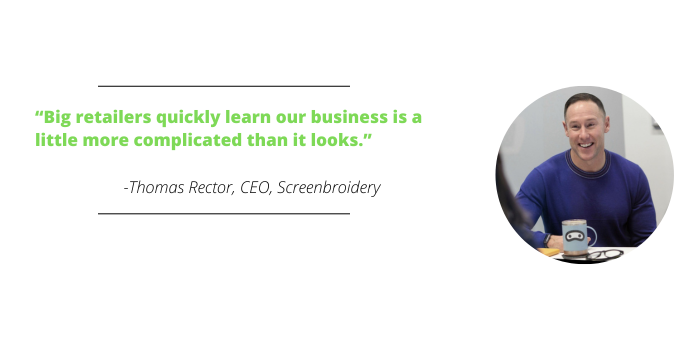
“Big retailers quickly learn our business is a little more complicated than it looks,” says Thomas Rector, CEO of Noblesville, Indiana-based distributor ScreenBroidery (PPAI 638974, D7). “They have to shift away from their traditional business model and the investment to build the infrastructure to accomplish this at scale is extensive. Plus, the margins are different from their traditional channels, and they have a huge marketing challenge to not confuse their primary customer base.”
Considering its established partnerships and ability to buy in bulk, it makes sense for Best Buy to tackle the tech sector, says Sasha Pirrie, vice president of sales at Tustin, California-based Logomark (PPAI 110898, S11) – ranked the No. 19 supplier in this year’s PPAI 100.
“But there’s flexibility in the old-school supply chain between distributors and suppliers,” Pirrie says. “We have relationships and can help each other out. I don’t know how that’s going to be for these big conglomerates.”
The People Business
The main reason that industry veterans aren’t easily intimidated by Best Buy and other retailers is because promo is a business built on relationships.
“When I walk the floor of The PPAI Expo in January, I know who I’ll see and I look forward to the conversations that will be had,” says Glenna Fulks, partner and chief connecting officer at Kite Meeting Management (PPAI 733403, D1) in Piqua, Ohio. “When I have a question or a challenge, I know who to call because I trust that a solution or an answer is forthcoming. This happens because of one-on-one personal relationships and not through agreements that aim to please (or barely satisfy) the masses.”
Fulks compares retail’s infiltration of promo to artificial intelligence disrupting the hospitality industry. For example, robot bartenders have been around various establishments for at least a decade. Although the robots provide the bare minimum of service, Fulks argues that they don’t really connect with the customer.
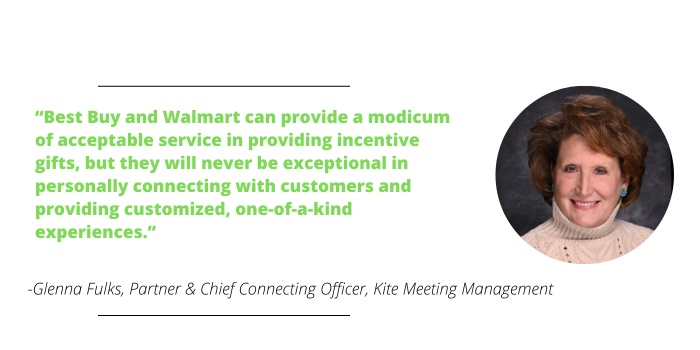
“If I walked into the bar and ordered a very cold and very dry martini made with Boodles Gin and garnished with two olives stuffed with Maytag Blue Cheese, could they do it? No, because their programming isn’t that deep or evolved. A human bartender would have to get involved,” Fulks says.
“And that is why Best Buy and Walmart can provide a modicum of acceptable service in providing incentive gifts, but why they will never be exceptional in personally connecting with customers and providing customized, one-of-a-kind experiences,” she adds. “They can deliver gifts in mass and likely at a cost that may appear to be the best deal, but when the surface is scratched, the gloss of their sales pitch loses its shine very quickly.”
Corporate Gifting’s Comeback
Although Best Buy poses a threat to traditional distributors, Fulks believes there’s plenty of opportunity to capitalize on this holiday season. “Corporate gifting is back and from what I can tell with my clients, it’s going to be bigger this year than last,” Fulks says.
For instance, several clients have already inquired about high-end apparel and “premium” items, such as crystal decanters and Tumi bags, in the $200-$250 per piece price range. Fulks recalls one client wanting to hand out a logo-embroidered jacket at $64 per piece last year – this year she’s offering the same company a backpack with embroidered logo at a cost of $84, which doesn’t include packaging, wrapping and shipping – all additional costs.
“The tissue paper will be imprinted with the company logo and the ribbon used will match the corporate color, which are little touches that keep reminding the recipient that someone went to the time and effort to create an experience for them,” Fulks says. “The gift needs to be truly one-of-a-kind and something that only a person like me – with unique industry contacts – can create.”
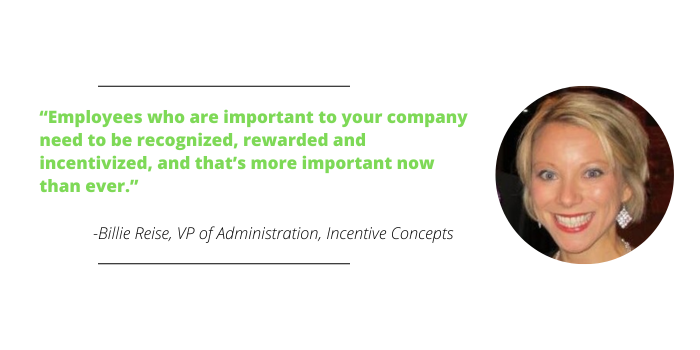
Corporate gifting experienced a post-COVID boom period, as companies across the United States struggled to hire and retain top talent during the “Great Resignation.”
- Many firms increased their investment in the employee experience, which included giving out branded merchandise as part of their recruitment and onboarding, and rewards and recognition strategies.
“Employees who are important to your company need to be recognized, rewarded and incentivized, and that’s more important now than ever,” says Billie Reise, vice president of administration at St. Louis-based Incentive Concepts (PPAI 212912, S10).
“It costs a lot of money to recruit, hire and train employees. Once you get the right ones, it’s important to keep them and to help get them to the next level. I’ve seen an even greater need for corporate incentives for these companies to continue to grow.”
Retail’s Unique Relationship With Promo
Although business has returned to pre-pandemic levels, Houston-based supplier HIRSCH (PPAI 221823, S10) – promo’s 12th leading supplier in this year’s PPAI 100 – began receiving holiday order enquiries as early as July. That has nearly 25-year industry veteran Peter Hirsch, MAS, founder and president of the firm, anticipating a strong demand for corporate gifting in the fourth quarter.
“Inventory will be key, and we encourage our customers to place orders as soon as possible,” says Hirsch, recipient of the 2022 PPAI H. Ted Olson Humanitarian Award. “Promo products that have a high perceived value will always be a part of the mix for employee retention, recruitment and onboarding. Everybody loves to receive a gift, and a retail brand elevates that experience.”
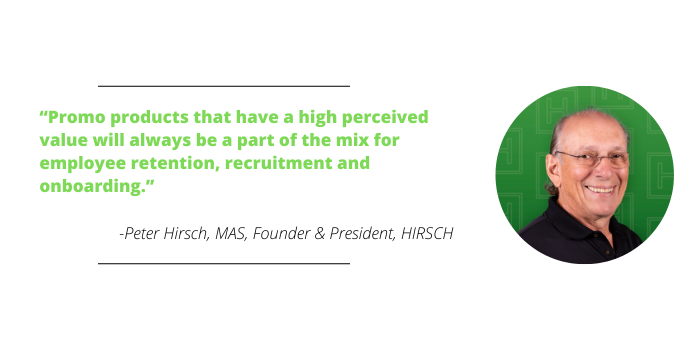
Last year, HIRSCH formed strategic partnerships with retail brands Cuisinart, Victor, Gerber, Coleman and FLIKRFIRE, as well as a promotional products industry exclusive relationship with personal, portable blender creator, Blendi. The move underscores retail and promo’s unique relationship, which Best Buy is adding yet another wrinkle to.
“Relationships, quality of customer service and imprinting quality are going to win, in most cases, and that’s where most industry players can hold their own,” Hirsch says.
Pirrie, for one, welcomes the competition.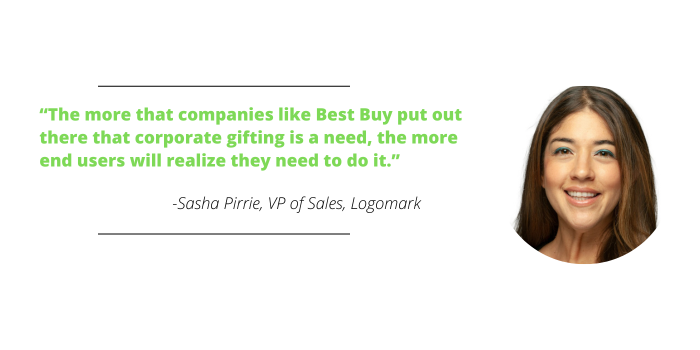
“The more big names talking about corporate gifting, the better,” she says. “Even though everywhere you go there’s merch and employee incentives, people still don’t know what corporate gifting is. During the pandemic, we on the supplier side saw how important it was to have employee programs for new hires and for retention.”
“The more that companies like Best Buy put out there that corporate gifting is a need, the more end users will realize they need to do it,” Pirrie says.

